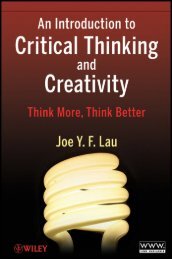A Selective Study in Post-Colonial Bengali Cinema - always yours
A Selective Study in Post-Colonial Bengali Cinema - always yours
A Selective Study in Post-Colonial Bengali Cinema - always yours
You also want an ePaper? Increase the reach of your titles
YUMPU automatically turns print PDFs into web optimized ePapers that Google loves.
33|Journal of <strong>Bengali</strong> Studies, Vol. 1, No. 2<br />
the partition: <strong>in</strong>stead of analys<strong>in</strong>g it, he <strong>always</strong> simply thought that it should never have happened,<br />
he <strong>always</strong> refused to “accept” it (290), as if it did not become a reality till he accepted it, and<br />
commented that he did not have anyth<strong>in</strong>g else to say about partition, except that this cutt<strong>in</strong>g of<br />
Bengal <strong>in</strong>to two parts was a disaster (290). There is a touch<strong>in</strong>g melodrama <strong>in</strong> his attitude, but he<br />
fails abjectly to offer an artistic <strong>in</strong>terpretation of partition: but then how could he <strong>in</strong>terpret<br />
someth<strong>in</strong>g that he <strong>always</strong> lived <strong>in</strong> denial of? Cultural clashes (just like religion, myth and faith)<br />
constituted a bl<strong>in</strong>d spot <strong>in</strong> the class only vision of the communists. His class conscious sympathy<br />
for the Muslims of Bangladesh notwithstand<strong>in</strong>g, Ritwik had to go alone to Bangladesh for shoot<strong>in</strong>g<br />
Titas Ekti Nodir Nam as it was <strong>in</strong>sisted by his Bangladeshi producers that his unit for Titas could not<br />
have <strong>in</strong> it a s<strong>in</strong>gle Indian (296). It goes without say<strong>in</strong>g that the tremendous oppression on the<br />
H<strong>in</strong>dus <strong>in</strong> East Pakistan/Bangladesh has never been a matter of concern for Ritwik. Interest<strong>in</strong>gly,<br />
after he returned from Bangladesh, Ritwik Ghatak enthusiastically started address<strong>in</strong>g his<br />
<strong>in</strong>terviewer <strong>in</strong> Kolkata (not a Muslim) as Mian (307). Bilet Ferat (England Returned) of 1921 was a<br />
comedy film by Dhiren Ganguly, one of the earliest films made <strong>in</strong> Bengal, and we th<strong>in</strong>k there could<br />
have been a Bangladesh Ferat with a character like Ritwik as its ma<strong>in</strong> protagonist.<br />
Ritwik exhibited an unusual propensity of call<strong>in</strong>g those he disagreed with CIA agents: a<br />
film-maker or two who could do someth<strong>in</strong>g <strong>in</strong> India already sold themselves off to CIA, he<br />
thundered (88). All those who are mak<strong>in</strong>g blockbuster movies with superior techniques at the<br />
<strong>in</strong>vestment of big capital are CIA agents too (30), and Delhi is full of CIA agents who do not allow<br />
revolutionary movies to be made (326), as Ritwik po<strong>in</strong>ts out. About fellow film-makers and artists<br />
who fail to toe the world revolutionary l<strong>in</strong>e, he reserves some choicest abuses: Ritwik calls<br />
Bergman a “jochchor” (sw<strong>in</strong>dler) because he depicts myth, spirituality, religious symbols and<br />
ancient mythical times of the Vik<strong>in</strong>gs <strong>in</strong> his films (<strong>in</strong>stead of show<strong>in</strong>g some proper materialistic and<br />
atheist subjects <strong>in</strong> a suitably communistic outlook), and accuses that Bergman is tak<strong>in</strong>g the audience<br />
backward, <strong>in</strong>stead of expla<strong>in</strong><strong>in</strong>g the ancient times away <strong>in</strong> the terms of the present; Ritwik Ghatak's

















